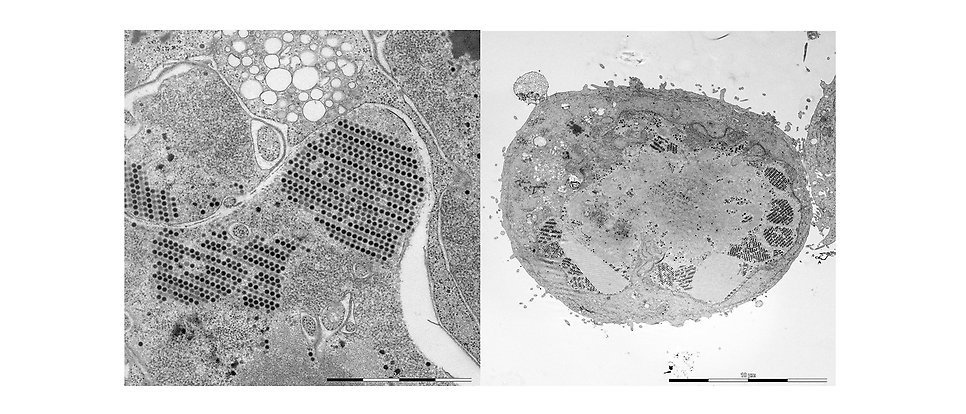Modified cold virus could provide new weapon against cancer

A LOAd703-infected pancreatic cancer cell photographed under an electron microscope. The image on the left shows, highly magnified, how the virus, lying in long rows, multiplies inside the cell. The right-hand image shows the whole cell and how structures inside it are destroyed. Photo: Vironova AB/ Lokon Pharma AB
Injections with a genetically modified virus have shown promise against pancreatic cancer in a new study conducted by researchers at Uppsala University, Baylor College of Medicine in Houston, Texas, and Lokon Pharma. In almost all patients, the tumours shrank.

Angelica Loskog, adjunct professor. Photo: Mikael Wallerstedt
“Half of the patients received the virus therapy as their first treatment for metastatic disease, while half had received one or more previous treatments for metastatic disease and still started to see more tumour reduction than they might have expected. The side-effect profile was also highly favourable. They got a slight fever and felt a little unwell a day after the virus was injected,” says Angelica Loskog, adjunct professor at the Department of Immunology, Genetics and Pathology.
She has been leading the development of the virus, named LOAd703, which is a modified adenovirus, or a common cold virus. It is injected directly into the tumour, activating the immune system. Once inside, it multiplies and becomes so numerous that the cancer cell eventually bursts. A new small army of viruses then spreads throughout the body and targets nearby cancer cells.
Like getting a vaccination
More importantly, however, the virus stimulates the body’s immune system.
“The virus has been modified using human immunostimulatory genes. When it enters the tumour area, these genes start to express proteins, which leads to inflammation in the tumour node. We can liken this to getting a vaccination, but directly into the tumour. The idea is to develop a systemic immune system, that is, an immunity to the tumour. If you get the immune system to attack the tumour cells, the body can control and reduce tumour growth itself,” explains Loskog.
The prognosis for pancreatic cancer is generally very poor. According to the Regional Cancer Centres in collaboration, in Sweden half of patients die within six months of diagnosis. The five-year survival rate is below five percent.
Tumours disappeared
In the new study published in Lancet Oncology, the researchers investigated whether their viral treatment could work alongside the standard chemotherapy for pancreatic cancer.
“At the hospital they noticed that if we injected a tumour with LOAd703, it could disappear and they had to switch and inject another tumour. They also started to witness some patients getting responses in multiple tumours even though we had only injected one. They also had those under control for a while,” continues Loskog.
The results of this and other studies conducted by the research team suggest that tumours are temporarily kept in check by the immune system, even during periods when patients are taking a break from chemotherapy. Since this study was small – only 21 patients – and lacked a control group, the researchers cannot make reliable comparisons with how the patients would have fared if they had not received viral treatment. However, as far as they can tell, patients were given a little more time in life. On average, they survived 9.3 months from the time of diagnosis.
Felt well
The researchers also received reports of another positive effect, however. Loskog has heard from the doctors that the patients themselves said that they felt well and that they were able to be more active than is usual with pancreatic cancer.
In their ongoing research, quality of life is an area that she and her colleagues want to examine more closely. Most importantly, they are working to make their virus even more effective by understanding which patients this treatment is suitable for and how best to combine it with other cancer therapies.
Åsa Malmberg
Publication:
Benjamin L Musher et al. (2024), LOAd703, an oncolytic virus-based immunostimulatory gene therapy, combined with chemotherapy for unresectable or metastatic pancreatic cancer (LOKON001): results from arm 1 of a non-randomised, single-centre, phase 1/2 study, Lancet Oncology. DOI:10.1016/S1470-2045(24)00079-2
